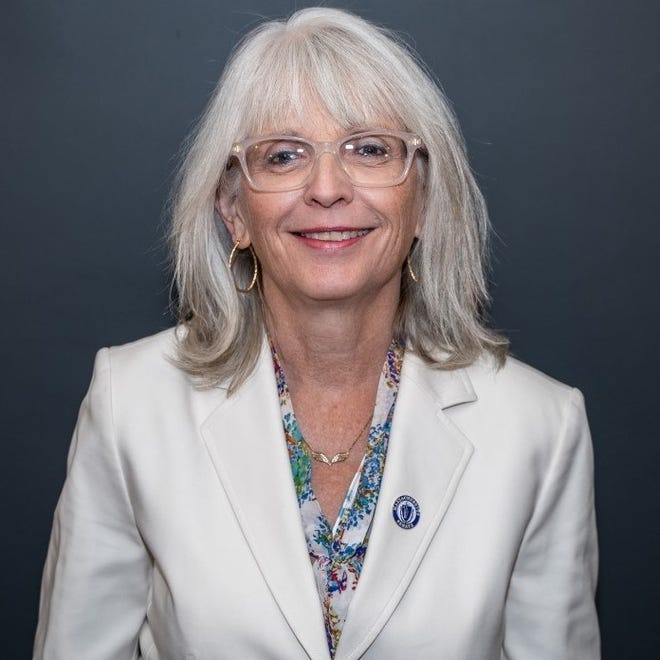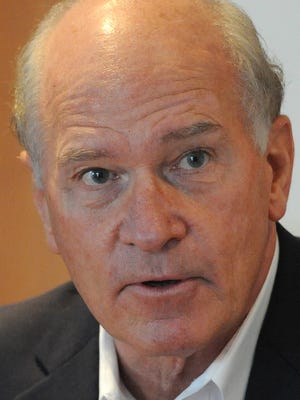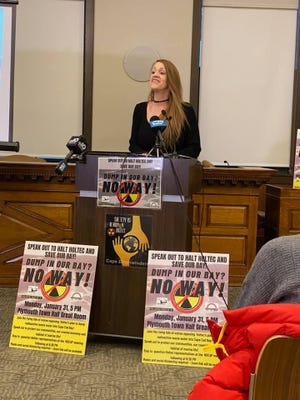Rally to stop Pilgrim plant wastewater discharge draws together businesses, activists
February 17, 2022

PLYMOUTH – A visceral rally preceded the virtual meeting of the Nuclear Decommissioning Citizens Advisory Panel (NDCAP) Jan. 31. The focus of both was the potential discharge of a million gallons of the plant’s wastewater into Cape Cod Bay by Holtec, the company overseeing the decommissioning process.
“That is outrageous and that must stop,” Cape Downwinders Director Diane Turco said in her opening remarks at the event held at Plymouth Town Hall prior to the meeting.
Her group and others organized the meeting to speak against the proposal, which Holtec said it would not pursue, at least through this year, after its plans drew criticism when first floated this past November.
The speakers represented an array of groups, including activist groups such as Pilgrim Watch and local and federal lawmakers. The effect Holtec’s plans could have both on the local tourism and fishing industries was highlighted and affirmed by representatives from those groups.
“All of these businesses depend on the perception and reality that Cape Cod Bay is clean, and we need to do all we can to ensure the bay remains clean,” Pilgrim Watch President and NDCAP member Mary Lambert said. “We need to get active to keep our bay from being radioactive.”
More:No decision reached on wastewater disposal at shuttered Pilgrim Nuclear Power Station
More:LOCAL & STATE MATTERS: Decommissioning the Pilgrim Nuclear Power Plant
Testing is underway on the wastewater and water in the bay to ascertain what exactly would be going into the bay and what its effect would be on both human and aquatic life. Enforcement agencies such as the EPA do not have a say in how radiation levels, mainly the radioactive isotope tritium, are regulated in the water, as that determination falls to the Nuclear Regulatory Commission (NRC).
The idea that the state is powerless to regulate any Pilgrim discharge is also being challenged, particularly in relation to whether it is prohibited under the terms of an agreement signed with the Attorney General’s office January 2020.
Seafood industry could be impacted
“The bare minimum we should expect from our government is safety,” Massachusetts Seafood Collaborative Executive Director Mark DeCristoforo said in his criticism of the NRC, which he described as both “Holtec enablers” and an “unelected bureaucracy.” “No agency properly fulfilling their job to the people could ever acquiesce to this.”

He said seafood is a $700 million industry in the state, making up a solid 2 percent of the state’s economy. In addition, he noted that five of the 10 most valuable ports in the state are on the bay, and an exceptionally large number of oysters consumed come from bays in Kingston, Plymouth and Duxbury.
Given that, even the perception of contaminated water could have a widespread negative impact on fishing and tourism, he said.
“We make our living in these waters, and the toxification of them would not only harm our business, but it would imperil the food security and health of countless numbers of Americans,” he said, “The aquaculture renaissance we’ve experienced would be destroyed by even the perception of nuclear contamination,”
Beth Casoni, executive director of the Massachusetts Lobstermen’s Association, agreed with the idea perception alone could do grave damage.

“This could jeopardize the perception to the tourists that come here and depend upon clean, healthy seafood,” she said. “It gives no regards to the thousands and thousands of people who depend on a clean and healthy ecosystem in Massachusetts.”
Pending legislation
The issue could be rendered moot if twin legislation in the state House and Senate banning dumping of nuclear waste into any Massachusetts waters becomes law. Violators would be fined $10,000 for the first violation and $25,000 for each subsequent one. Each bill has advanced to the Joint Committee of the Judiciary for review.
State Sen. Susan Moran (D-Falmouth) represents the Plymouth and Barnstable District and is presenter on the Senate version of the bill. She attended the rally and credited the different groups that had come together for a common cause.

“This is a testament to the strength of our community,” she said.
Beyond the effort to ban the discharge into the bay, Moran said she hopes to address the role residents play in decisions regarding the plant.
“I’m working on further reforms to increase your choice and decision making to make sure we put our health and our safety before (the concerns of) the industry,” she said. Your stories live here.Fuel your hometown passion and plug into the stories that define it.Create Account
In video messages played during the event, Sen. Ed Markey, and Rep. Bill Keating each affirmed their commitment to ensuring Holtec does not move forward with any discharge plans. The entire Massachusetts legislative delegation, which also included Sen. Elizabeth Warren and Rep Seth Moulton, signed a letter to Holtec last month urging them not to release the water.
“We need to have a safe plan of how Holtec waste is disposed, especially when other options exist,” Keating said in his message

Alternatives
Those other options include evaporating the water, which Holtec has already done at the closed plant, trucking the water to an off-site containment location, or storing it on site as Holtec is doing with the spent fuel rods.
Both during the rally and the NDCAP meeting that followed, the evaporation idea was criticized, as it moves any potential contaminants into the air that could then come back into the ground and water as precipitation.
Holtec maintains they have not ruled out any of the available options, although they said the fuel required to evaporate the water, which was previously done using residual heat from the reactor, or trucking to sites as far away as Texas would both use fossil fuels and cost more. They also cited the safety concerns of transporting toxic materials, even though they have already done so with other waste materials from the plant.
Keating also took aim at Holtec’s claims that radiation levels in the water would fall below what individuals may be exposed to getting an X-ray or MRI.https://dec645955b88131cb1a83a12e0869986.safeframe.googlesyndication.com/safeframe/1-0-38/html/container.html
“The difference is you have to sign your consent for those,” he said. “Our consent is not here. There’s an alternative to dealing with this.”
The recognition of the need and duty to maintain clean resources is something the Wampanoag Indian tribe has taken seriously for thousands of years, Herring Pond Wampanoag Tribe Chairperson Melissa Ferretti explained. That extends into the recent past, the present and the future.

She spoke after leading a prayer in Wampanoag and translated to English, which thanked ancestors and creators for the earth, sky, rivers and waters, land and all creatures – all topics of concern with the wastewater.
She recalled the plant being built when she was a child.
“Residents were outraged and worried about what might happen to this place,” she said, “Although we didn’t like it, we all learned to accept the power plant with an ever-watchful eye. “
Holtec’s actions, she said, have changed that.
“Here we are today, outraged again by the thought that (Holtec) is considering dumping a million gallons of nuclear waste into our ocean, into our waters that sustain us, and this dirty waste could travel for miles on the back of our fish; this could have a grave impact on our way of life and of yours.”
She did, however, find a positive aspect in that the issue has brought together a diverse coalition of individuals and organizations.
“When it comes to doing what is right…Plymouth always stands up and shows us what is right and speaks out against what is wrong.”
The Seafood Collaborative’s DeCristoforo made a similar, though more forceful, call to action.
“The diverse group assembled here is strong, and in fact we form a mighty fist capable of asserting our power and demanding that this environmental vandalism is not allowed to stand,” he said. “But if that fist is to remain clenched and able to strike, we must persist with this exact sort of grassroots effort, because unfortunately as soon as this issue is forgotten by common people like us, when it is no longer discussed online, in the newspapers, at the store or the pub, the specter of dumping will quickly return, and we cannot allow that.”
No plans were announced by Holtec in the meeting that followed, with both the company and its critics waiting on test results and further communications from the state. The next NDCAP meeting is March 28.